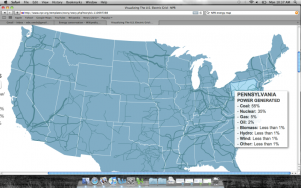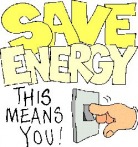WHY ENERGY CONSERVATION?
We use energy everyday for nearly everything we do: to make coffee, to power computers, refrigerate food, receive mail, cook dinner...the list goes on and on. It's becoming more and more apparent that this "addiction" to energy is costly, in terms of money, but also for the earth and the communities affected by our constant energy consumption.
In Pennsylvania, 55% of our power is generated from coal, 35% from nuclear energy, 5% from gas, 2% from oil and less than 4% from biomass, hydro-power, wind and other renewable energy sources.
Nearly every known method of producing energy has negative effects on the Earth and often poses safety and health hazards to the human communities involved in the extraction and processing of the natural resources involved. While safety regulations and precautions are set, we continually hear about coal mining disasters, nuclear waste spills, oil spills, contaminated water supplies and increasing correlations between human diseases and pollution. And now we are realizing the frightening fact that fossil fuels are indeed a finite resource. They are becoming harder and more expensive to extract for use.
While switching to cleaner energy sources is a positive and necessary step, the transition to clean energy takes time and money. The easiest most cost effective way to lessen the negative impacts of our energy use and ensure the longevity of our energy supply is to conserve our energy reserves. This means using less energy.
FAQS
How does energy conservation differ from energy efficiency?
An energy efficient product uses less energy to produce the same effect than it's less-efficient counterpart. For example, according to Energy Star, a Compact Florescent Light (CFL) bulb uses 75% less energy than an incandescent bulb to produce illumination. Increasing efficiency is a great way to use technology to decrease our energy use. However it is important to remember that just because we can get more bang for our buck with efficiency...it's still best to turn off or unplug equipment that uses electricity.
Does purchasing or producing renewable energy count as conservation?
Nope. Using renewable energy is another great way to decrease our dependence of fossil fuels and other non-renewable energy sources, however its doesn't fall under energy conservation because, after all, we are still using energy.
How does energy conservation differ from energy efficiency?
An energy efficient product uses less energy to produce the same effect than it's less-efficient counterpart. For example, according to Energy Star, a Compact Florescent Light (CFL) bulb uses 75% less energy than an incandescent bulb to produce illumination. Increasing efficiency is a great way to use technology to decrease our energy use. However it is important to remember that just because we can get more bang for our buck with efficiency...it's still best to turn off or unplug equipment that uses electricity.
Does purchasing or producing renewable energy count as conservation?
Nope. Using renewable energy is another great way to decrease our dependence of fossil fuels and other non-renewable energy sources, however its doesn't fall under energy conservation because, after all, we are still using energy.


